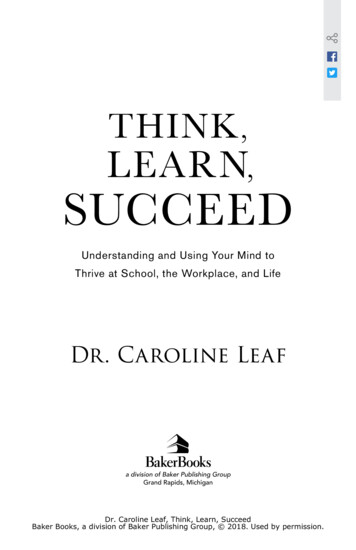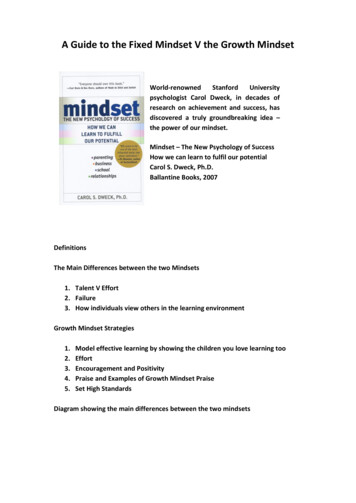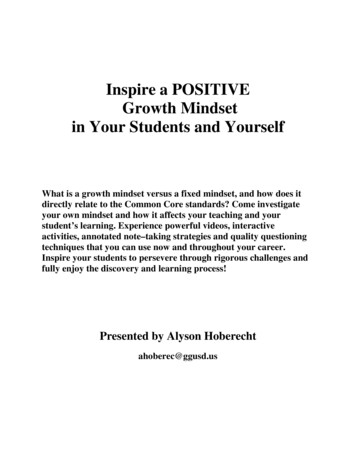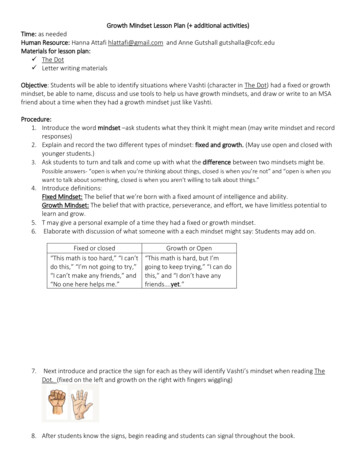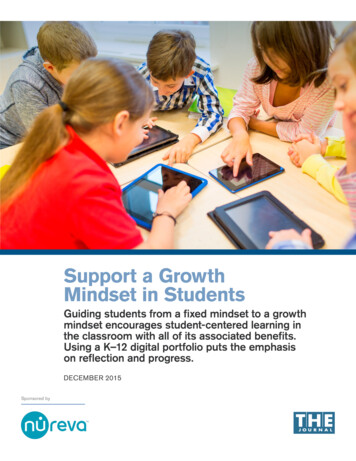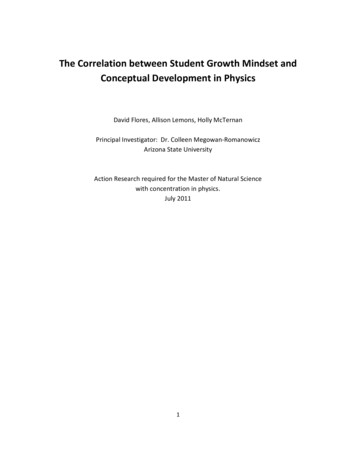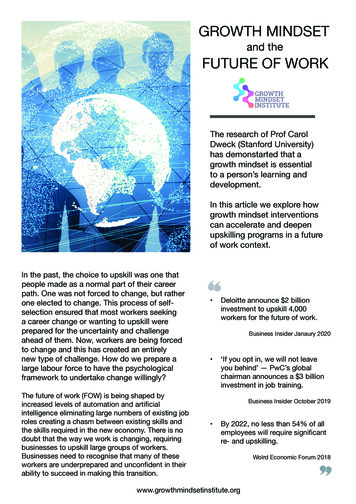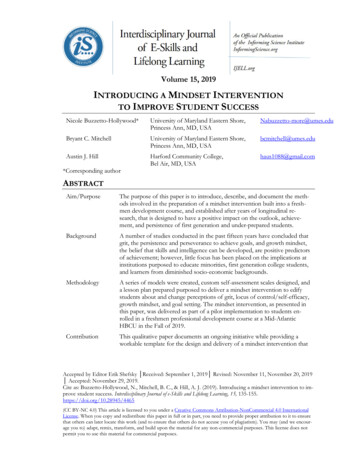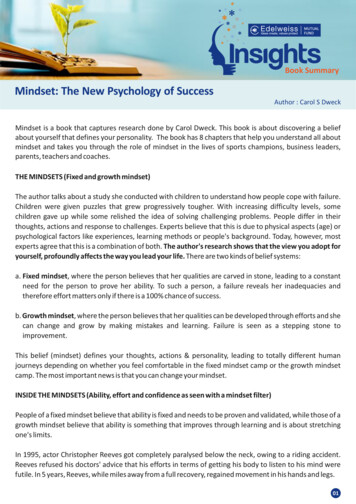
Transcription
Growth MindsetWorkbookGet the tools, inspiration and confidenceto help you make an impact at work.
WorkbookGrowth MindsetExploring my motivations and purposeThis exercise is all about you and what motivates you. You can unlocka courageous growth mindset in yourself by harnessing what givesyou motivation and consciously aligning your energy to a purpose.What gives me my motivation?In the space below, list some examples of what motivates you at work (e.g., havingclear goals, being challenged by others, positive feedback, financial reward).Next, listen what motivates you outside of work (e.g., having adventures, setting agoal, using your sense of humour).From the lists above, consider which are in your control and which are dependentupon others. Choose your top three motivators which are driven by you, and writethem below.1232from
Growth MindsetWhat gives me my purpose?Motivation keeps us going, but a purpose gets us started! We all need a reason tohelp unlock our energy. Is your purpose ‘mission’ or money? Impact or enjoyment?‘Mission’ purpose‘Mainstream’ purposeChanging the worldSuccessFameCompetitionContinual improvementFaithProving yourselfFinancial securityMaking somethingEnjoymentLearningSocial connectionsTo feel usefulTo teach othersLook at the examples and note down your primary purpose below.3from
Growth MindsetWhat gets in the way of my courageous growth mindset?Your mind is a powerful tool at work, but your thinking can workagainst you if it turns inwards in a critical way. Use this exercise toexplore your unconscious habits, expectations, levels of conformity,limiting beliefs, strategies, and personas.HabitWhat are some habitual behaviours that may bekeeping you stuck?A recurrent, oftenunconscious pattern ofbehaviour that is acquiredthrough frequent repetition.ExpectationComplete the following sentence. “To be good atmy job I should.”How we think we shouldbe, or how others think weshould be.ConformityMatching your beliefs andbehaviours to group norms.How much do you conform to group norms? Scoreyourself out of five by ticking a box below.12Conformist345RebelWhat will I be instead?4from
Growth MindsetWhat gets in the way of my courageous growth mindset?Limiting beliefsComplete the following sentence. “I do not stretchmyself because.”Thoughts about ourselves,others, or the world aroundus that limit our potential.StrategyHow do you behave when you need to impressprofessionally?How we adapt ourbehaviour, oftenunconsciously, to fit in, beliked and succeed.Restricted meHow do you react when you hold back? Whatwhat others be experience of me?The person and persona Itake on when I hold back.5from
Growth MindsetWhat can be achieved with more personal courage?Step into your imagination and use these exercises to explore whatyou can achieve by applying courage, grit, a sense of adventure, anda focused mind.Our research shows that most people acknowledge, on average, a 30% gapbetween their current and optimum performance. That’s a 30% opportunity forgreater results! Are you unconsciously conforming and taking the path of leastresistance? The root of the word ‘courage’ comes from the French word ‘coeur’ whichmeans ‘heart’ - something that’s in all of us. It’s that extra something that we are allcapable of. It’s the difference between safe and mediocre, ‘done it’ and ‘incredible’.Reflect on a time that you hesitated and didn’t act or speak up.What would have helped you get over your fear or hesitation at that moment?Consciousness is key. We can’t all conquer the world in a day, but we can apply acourageous growth mindset to every situation. How unconsciously complacent areyou? See if you can answer the questions below. Most of us struggle to remember.Can you?What did you have for lunch yesterday?What did you do yesterday morning?What actions were agreed in your last meeting?6from
Growth MindsetGalvanising your courageous growth mindset in action!It’s one thing to imagine courageousness and growth in our mindset,but it can be another to practice it in everyday meetings orinteractions.Are you experiencing unconscious complacency? In conversations and meetings,do you only stick to what you know or your own area of expertise?Are you simply engaged? Do you speak when it’s your turn and remain activethrough meetings and conversations - or do you listen to your own thoughts?What does a courageous growth mindset look like in action? Do you grab theflipchart/ use a digital whiteboard or facilitate a challenge for others throughconversations? Even when the topic isn’t your area of expertise? Are you askingquestions, summarising, and driving the action to benefit the team?Read the text above and reflect. What are the differences between these threeapproaches? How would you look, feel, and behave?Unconscious complacenyEngagedGrowth mindsetWe taught to set SMART goals, where the ‘R’ stands for ‘realistic’. Realistic goals willnot support a courageous growth mindset. They are about playing safe. What if the‘R’ stood for ‘revolutionary’ or ‘radical’? This would help make your goal a ‘stretchgoal’, rather than a ‘SMART goal’. Stretch goals drive a courageous growth mindset.Write down a work goal below.Now STRETCH this goal and make it radical!What do you need to do differently to achieve this new goal?
WorkshopGrowth MindsetThese activities links to the workshop you’ll be taking part in. Ask thetrainer if you require any further guidance.Stretch goal planner8Stretch goal toachieve this weekWhen I achieve thisgoal, I will.What is holding meback?What can I do tomake it happen?Stretch goal toachieve this quarterWhen I achieve thisgoal, I will.What is holding meback?What can I do tomake it happen?from
Growth MindsetImpact vs effortReview the actions below. Consider how much effort each action would take,compared to how impactful it will be for achieving your goals. In you have printed outthis workbook, plot each goal onto the graph. If you are working digitally, click on the‘X’ icons and select a number that corresponds to the goal you are plotting on thegraph. If you want to plot more precisely, you could use a scrap of paper.1.2.3.4.5.6.7.8.9.10.11.12.13.14.Have a positive statement you say to yourself each morningOffer to take and circulate meeting notesShare your ideas in a meetingShare your ideas creatively in a meetingFor times when you’re feeling underconfident – have a mantra/song/person you callFor times when you do something well – celebrate it for yourself/share with your team/tellyour Line ManagerAsk to present on a topic you care about at a knowledge-share or team meetingResearch an area of business growth to shareAttend a CPD course on something you care about and share that learning with your teamVoice your opinion when you don’t agree with somethingFind a mentor to support your developmentBecome a mentorJoin an interest group at your workMake a conscious effort to network with people at different stages of their career andschedule some om
Workshop notes
Growth Mindset It's one thing to imagine courageousness and growth in our mindset, but it can be another to practice it in everyday meetings or interactions. Galvanising your courageous growth mindset in action! Read the text above and reflect. What are the differences between these three approaches? How would you look, feel, and behave?
